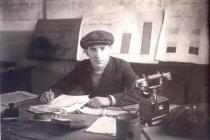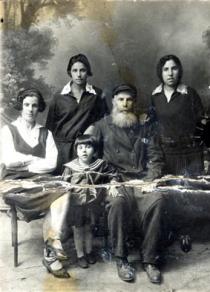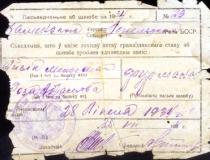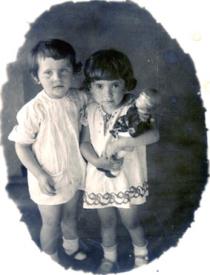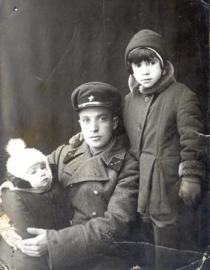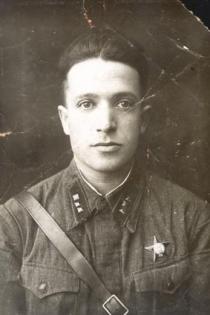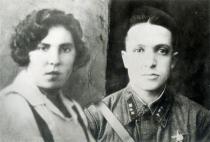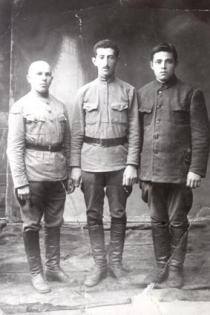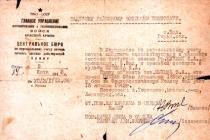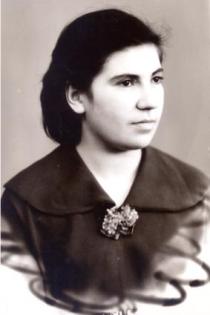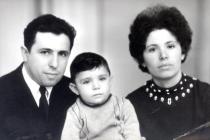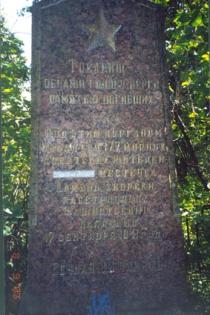This document is a notification about death of Efim Shukhman, my uncle. It was dated 14 July 1943. We received it in Vad village (Gorky region) being in evacuation.
I remember June 21 in 1941 (it was my birthday - I was born in 1935, hence in 1941 I was going to be 6 years old) - it was Saturday. And all our relatives gathered at our place to celebrate my birthday on Sunday, the 22nd of June 1941 - the day when the war burst out.
All our relatives came. At that time we lived in Ossinovaya Roscha [suburb of St. Petersburg], my daddy served there in a military camp. Two my grandfathers came too.
One of them - Avraham underwent surgery a short time previously; I remember very distinctly that his hand and shoulder were bandaged. I remember him eating.
My mum prepared kosher food especially for him: staying in hospital, he did not eat hospital meals, his daughters brought it to him especially. Mum told that in Belarus (Kamyen shtetle) there was Synagogue near his house, and my grandfather used to be a synagogue warden.
On holidays he invited everybody to visit his place - it means that they were rather well-to-do, because he had a lot of children and everyone in his family worked. My grandfather was a very hardworking person.
My birthday was celebrated by all our relatives. All our relatives came from Belarus and other places. We all gathered round the festive table. I had a separate children's table, where we were sitting together with my cousin.
I remember two my grandfathers and my aunts at that day (my grandmothers were already not alive by that time). But we were all very much worried after the information we had heard on the radio about the attack of Germany.
Father was summoned to the unit right from the celebration. Next day all our guests left for their homes, all around the country. Almost all of those, who went home to Belarus, perished. The Germans burnt and shot everyone.
My first aunt was Lubov, a sister of my mum. Her name after her husband was Nemtsova. She was born in 1895 and died in 1955. Lyubov with her family and grandfather Avraham lived in Belarus, in Kamyen shtetl.
They had three children, sons Mikhail and Zinovy and daughter Sofia. Her husband Samuil was a men's tailor. I remember how mother told us that grandfather accepted him to the family and she helped him to sew. He taught her the tailor's job.
Later it was her profession, which allowed her to earn money. In 1941 the Germans approached Kamyen, aunt Lyubov escaped with her children. She simply took them and ran. She arrived in Gorky region, where we already lived. Her husband Samuil was at the front and died right after the end of the war. She spoke poor Russian, mainly Yiddish.
I remember Efim Shukhman, senior brother of my mum. He was the first to move to Leningrad at the end of 1920. He worked as a shoemaker in a co-operative in Leningrad, and he was a very good shoemaker.
It was Efim who contributed greatly to subsequent moving of his sisters and younger brother Naum to Leningrad. He perished at Nevsky Pyatachok at the approaches to Leningrad on the 15th of January 1943.
[Nevskaya Dubrovka is a settlement on the right bank of the Neva river, where the troops of the Leningrad front twice (in Sept. 1941 and in Sept. 1942) forced a crossing over the Neva river and captured the beach-head on its left bank (the so-called Nevsky Pyatachok, meaning 'a very small plot of land near the Neva river'.
They hold their positions for about 400 days and participated in bloody battles.] I still keep notification about his death. He served as a sniper. After daddy's death, my mum received only one letter from Efim, where he consoled her. He wrote that she should not be afraid, because he would be helping her - she was his beloved little sister.
It was him who gave money for her wedding. Uncle Efim loved mother very much, she was his favorite. She was the youngest and he was the eldest in the family. Uncle Efim sent mother a parcel with food products and wrote a note saying that he would never leave her and help her to bring up the children.
Mother wrote a reply to Efim, but soon we received a notification about his death. Thus mother was left alone without any support. Uncle Efim is included in the electronic Memory Book [Terminal of the Electronic Memory Book can be found inside the monument of Victory (it is a branch of the city Historical Museum) in our city (situated in Moscow avenue, on the way to airport).
Everyone, who was lost during the battles of Leningrad, was put into the electronic data base. And everyone can come there, name a lost person and get a printed out document.
Sofia Furman has this sort of document regarding Efim, who perished near the Sinyavinskye Vysoty, in Tartolovo settlement]. Grandfather Mendel, who starved to death in besieged Leningrad in winter of 1941-1942, is also included in that Book.
My mum had a sister - Sofia Shukhman, but I know very little about her. I only know that she died on the day of her wedding. Mikhlya Shukhman (a wife of Avraham Shukhman), mother of all these children died early, in 1919.
Senior daughter Lubov married even earlier, and Sofia took care of all who were younger; she was a mother for them. Going to marry, Sofia felt very anxious about her younger sisters and brother - who will take care of them?
She was thinking it over all the time: how will they manage without her? They all were little at that time, and she suffered from heart disease. Therefore on the day of her wedding she died, I know no details. I was named in her honour.
The youngest brother of my mum was Naum. During the war he was a pilot. Their squadron flied to bomb Berlin during the war. After the end of the war he served in the Far East (Kamchatka and Sakhalin) of the USSR.
Rita Shukhman was a disabled child. She had difficulties moving her hand and leg; she received medical treatment and lived here in Leningrad in Lermontovsky prospect. Her sister Zlata Shukhman (everybody called her Zinaida) lived with her.
My mother Rosa Shukhman (after her marriage - Furman) was the sixth child, as Naum was the youngest.

